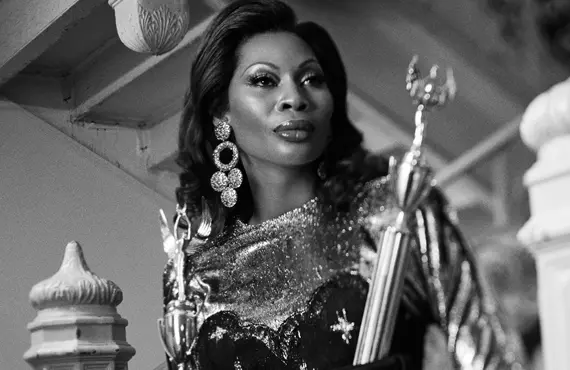Pose's Dominique Jackson Reflects on Madonna's Influence
-
 Dominique Jackson as Elektra Evangelista in Pose (FX)
Dominique Jackson as Elektra Evangelista in Pose (FX)"The category is: live… work... POSE!" Billy Porter’s Pray Tell announces in the title sequence of Pose, ushering viewers into the world of ballroom. The four dayglo letters flicker on, illuminating the looks, moves, and opulence that provided a respite against the threat of HIV and violence toward the queer community in the 1980s and '90s.
Ballroom flourished in the '80s behind a wall. Outside, there was danger. Inside, there were sequins and trophies. But on March 27, 1990 (the kick-off point for the FX series' second season, premiering June 11), Madonna tore down that wall with the help of Greta Garbo and Monroe, Dietrich and DiMaggio.
For some ballroom regulars, the Queen of Pop's "Vogue," with its immediate popularization of the sounds and moves that permeated their houses, was an indication of acceptance: Something we created was now topping the charts. For others, it was a warning signal: Outsiders will erase us from our own work and drop us entirely once this fad passes. For Dominique Jackson, who plays Pose's imposing matriarch Elektra Evangelista (née Abundance), it was neither. Madonna's club beat floated down from Harlem to the Caribbean, arriving in Jackson's native Tobago as a beacon of hope. The song offered a window into the culture and community she craved, but as a teenager, could not put to words.
"I had no idea what it was to be trans," Jackson says. "The only things I knew were the epitaphs, like 'batty boy' in the Caribbean and the 'F' word." When I saw the ['Vogue'] video, it was like, Wait a second. All I have to do is get out of this island and maybe I can exist, because there are gay people out there."
Pose transports Jackson back to that moment of clarity, but not without unearthing adjacent traumas. As so many in the trans community did and do, Elektra turns to sex work for survival. She capitalizes on the fetishization of her own identity. She seeks protection in a relationship that was not mutually giving. These are scars Jackson and her character share, but both are now equipped with the years and responsibility of being a mother.
"Elektra is a combination of many women in the ballroom scene who were pioneers," Jackson explains, acknowledging such house mothers as Danielle Revlon, Pepper LaBeija, Dorian Corey and Octavia St. Lauren. "I was blessed to be able to sit with them and have conversations with them as a little girl. I was being handed a legacy I had no idea I was being handed."
One of the most influential figures in Jackson’s inherited spiritual parenthood is Hector Xtravaganza of the House of Xtravaganza, who served as a consultant on the series until his death in December last year (the season’s June 5 New York premiere was dedicated to his memory). As she speaks, Jackson consistently refers to him as "my dad," and notes he did not pass before 1: seeing Pose reach the small screen, and 2: imploring Jackson to make a vow: "Promise me you will never remove yourself from ballroom. Ballroom is a part of you."
Jackson stays true to her word by continuing to bring Elektra to life, from her glamour to her hardships. Through her performance, she discloses both to the masses, blasting a resonant pulse to a world kept behind closed doors — not unlike Madonna did with "Vogue."
"His affection for her was beyond. He always appreciated what she did," Jackson said of Hector’s relationship with Madonna. "He would say if Madonna didn’t bring 'Vogue,' he would not have been working, and a lot of people would not have been noticed." She caught herself repeating her chosen father’s words. “This is all from my dad’s persp — oh my gosh, I can’t believe I’m doing this right now. He told me I would be doing this."
While Elektra may feel ambivalence for Madonna’s chart-topping hit, Jackson did not as a teen, and, having heard firsthand her impact on her father, still doesn’t. “What Madonna has done is amazing. She didn’t just come into our community and take something from us. She consulted and was with everyone.
"She is a queen. One of the many queens."
People are talking about Pose in our forums. Join the conversation.
Ryan McPhee is a culture writer and editor who specializes in theatre and the culinary arts. Follow him on Twitter at @rdmcphee.
TOPICS: Pose, Dominique Jackson, Madonna